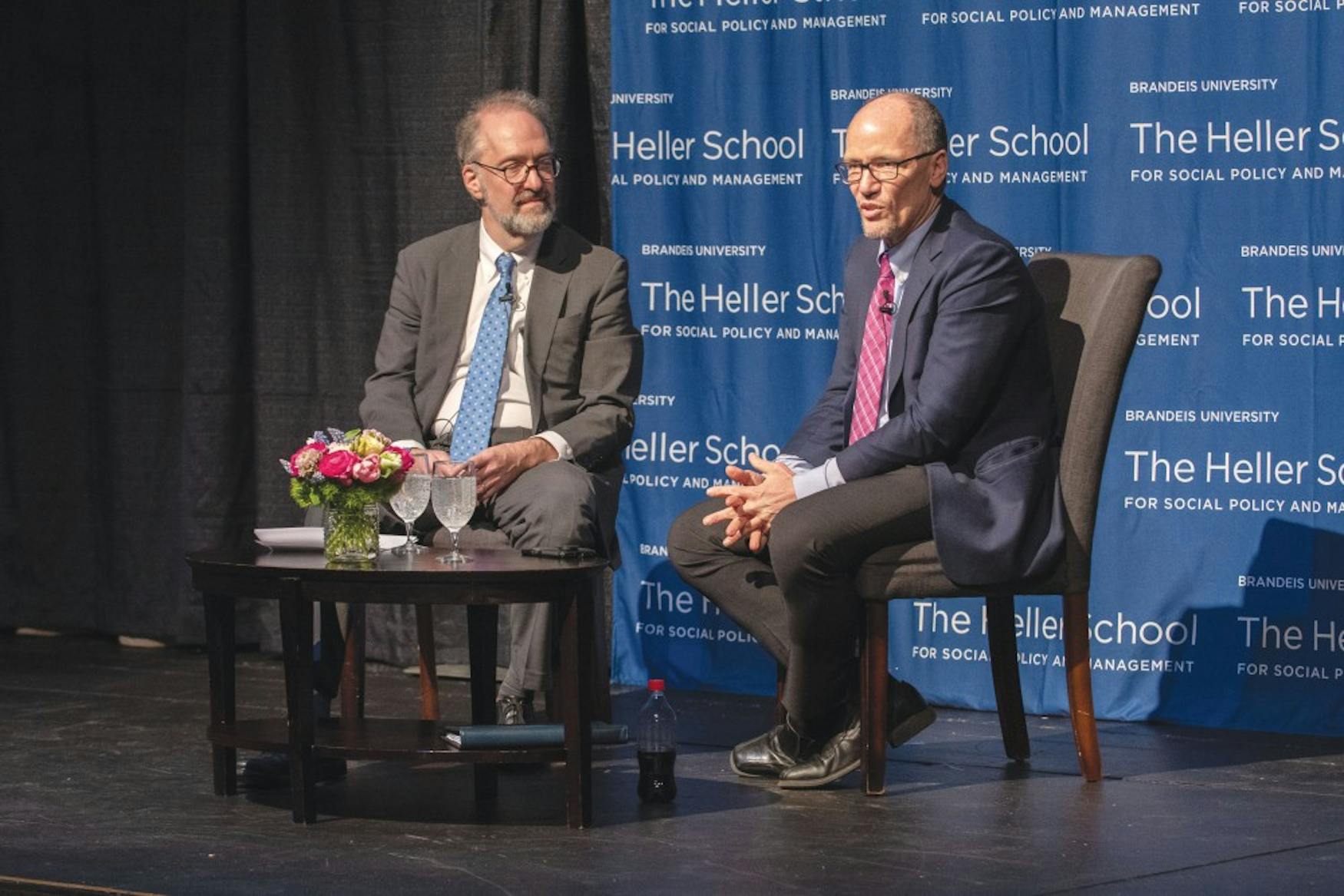DNC chair discusses upcoming elections
DNC Chair Tom Perez gave a talk on progressive policy hosted by Heller School Dean David Weil.
Democratic National Committee Chair Tom Perez spoke about his career and the 2020 elections in the Shapiro Campus Center on April 1. The event, titled “Tom Perez on Progressive Policy in the Trump Era,” was a conversation with Heller School for Social Policy and Management Dean David Weil.
Perez’s career in government began with his work as a federal prosecutor in the civil rights division of the Department of Justice under President George H.W. Bush. Later, he was an advisor to Sen. Ted Kennedy.
Starting in 2002, Perez served on the Montgomery County Council in Maryland. “Service at a local level is incredibly impactful,” he said, recalling his role in implementing health clinics in Montgomery County schools that have high concentrations of students from low-income families.
During his time on the county council, Perez witnessed the role of immigrants in Maryland’s economy. He pointed out that foreign-born Maryland residents are more likely to have a college degree than native-born Marylanders. “The story of Maryland is the story of America,” he said.
Perez explained his personal connection to immigration. His parents were forced to leave the Dominican Republic after his father spoke out against the dictator at the time, General Rafael Trujillo. His parents moved to the United States and eventually settled in Buffalo, New York, where Perez was born.
In 2007, Perez became the Maryland secretary of Labor under Governor Martin O’Malley, and was later appointed by President Barack Obama to serve as the U.S. secretary of Labor from 2013 to 2016. “We were at the forefront of fighting income inequality, and, by extension, racial inequality,” he recalled. “That is just not a priority” under the current administration, Perez said, adding, “The party of Trump is the party of xenophobes.”
In 2017, Perez was elected as the chair of the DNC. “Our mission is to elect Democrats up and down the ballot, from school board to the Oval Office,” he said.
Perez noted that Donald Trump’s campaign rhetoric propelled him to victory in 2016 by “put[ting] fear on the ballot,” and emphasized the importance of Democratic candidates campaigning on hope rather than fear.
Looking forward to the 2020 elections, Perez said the Democratic Party would be aiming to replicate the successes of the 2018 elections using “unity of purpose and unity of message.” He explained that in 2018, healthcare was a uniting issue for Democrats across the United States, and making it a principal issue in the party’s platform helped candidates win seats. “We won elections at scale in 2018 because we focused on real issues — healthcare.” Republican candidates, he said, “were talking about caravans,” referring to the large group of migrants from the Northern Triangle, which includes Guatemala, Honduras and El Salvador, that was headed toward the United States during the midterm election season.
Perez then stressed the importance of making elections more fair, such as by reducing the power of superdelegates, encouraging states to adopt primaries rather than caucuses, addressing campaign finance laws and curbing gerrymandering. He also said that the Republican Party employs voter suppression tactics to win votes in lieu of having viable candidates. “That’s why they engage in voter suppression,” he said. “They cannot win the battle on the merits” of their candidates.
Perez discussed the role young people, especially millennials, play in politics. He said that millennials are now the largest age voting bloc, and that millennial turnout increased 50 percent this past election cycle. “The difference maker in so many cases is how many more young people voted,” Perez said.
Despite his optimism about the impact of millennial voters, Perez said that his own college-age children told him they had friends who didn’t vote. These friends “didn’t think it mattered,” Perez said. “Well, talk to our Muslim brothers and sisters. Talk to anyone with a preexisting condition. Talk to a woman who thought that Roe v. Wade was settled law. And the list goes on,” he said.
Perez said that while campaigning through the use of text messaging can be a useful tool when it comes to reaching millennial voters, the rising use of cellphones is also making people susceptible to misinformation. He said that the Internet allows people to “weaponize propaganda” by disseminating it quickly and on a large scale.
Perez also criticized the Trump administration for making “the most reckless tax cut in American history.” He reprimanded Republican congressmen for their handling of healthcare policy. “History will not only judge Donald Trump partially, it will judge Mitch McConnell, Paul Ryan and all of the other cowards who refused to stand up to this president,” he said.
In honor of the Heller School’s 60th anniversary, Weil concluded the event by asking Perez who his “social justice hero” was. Perez named Dr. Martin Luther King, Jr. and Cesar Chavez, saying, “They embody the determination to form a more perfect union. … They embody the notion that everyone — regardless of the color of your skin, your first language, who you love, who you worship — is entitled to opportunity.”



Please note All comments are eligible for publication in The Justice.